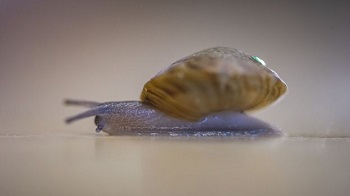The greater Bermuda land snail was thought to have disappeared for many years until an empty shell turned up in the territory’s capital city, Hamilton.
Live snails were then found among litter in a nearby alleyway.
Some were flown to Chester Zoo for a unique breeding programme.
More than 4,000 snails raised at the zoo have now been taken back to the island and released.
Many more captive snails will soon be returned to their homeland to help give the species a new lease of life.
A wildlife ecologist for the Bermuda government, said the snail was a “Lazarus species”, which was considered extinct not so long ago.
Then, in 2014, a man walked into his office in the capital, Hamilton, holding a fresh snail shell.
“It turned out that, yes, this was in fact the greater Bermuda land snail, a species that we thought had gone extinct 40 years earlier,” he said.
Water dripping from air conditioning units had created an environment where the animals could survive unnoticed.
“It turned out that the plastic bags were one of the favourite places for these snails to hang out, because of course it retained the moisture the best – and the snails are very vulnerable to drying out,” said Doctor.
“At the last count we’ve got somewhere around 13,000 snails – we’ve probably got more than that, they’ve had a lot of babies since then,” said the man who cares for the snails.
The secret of breeding success, she said, was nice soil and their favourite foods, which include sweet potato and lettuce.
Thousands of the Chester Zoo snails have now been sent back to Bermuda for release in nature reserves.
The snails are thought to be doing well in their new home.
The greater Bermuda land snail is unique to Bermuda and is part of an ancient lineage of land snail that dates back in time over one million years.
Lara Khouli.

